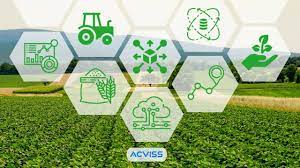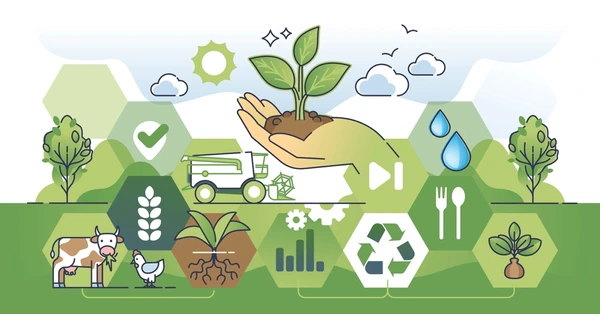How curriculam in agribusiness are adjusting to sustainability and climate change? With more than 50% of the workforce employed in the country, agriculture is the foundation of the Indian economy.
Climate change, which has an impact on crop yields, water availability, and overall agricultural production, presents the industry with substantial problems. As a result, educational establishments are updating their agricultural curricula to incorporate sustainability and climate change adaptation.
The goal of this change is to provide upcoming agronomists and farmers with the information and abilities needed to lessen these effects and advance sustainable agricultural methods.
One of the most important aspects of agricultural studies is the inclusion of climate change consequences and remedies in agricultural curricula. In order to assist students comprehend how temperature fluctuations, extreme weather events, and changing weather patterns affect agriculture, universities and colleges are introducing climate science into their curricula.
These include classes on data analysis, forecasting, and climate modeling, which help students anticipate and adapt to changes in the climate. Let’s hear more from Gitam Deemed to be University’s Senior Director of Admissions, Nidheesh Saxena.

India, which is confronting serious climate-related issues, has started a number of programs to mitigate climate change and advance sustainability. Important government initiatives in this field include:
- Through eight national missions centered on sustainable development, NAPCC tackles climate change. Solar energy, energy efficiency, sustainable agriculture, water conservation, and the Himalayan ecology are among its main goals.
- The goal of the Pradhan Mantri Krishi Sinchai Yojana is to guarantee “More Crop Per Drop” by encouraging effective water management techniques.
- The National Solar Mission promotes the use of solar energy to lessen reliance on fossil fuels and greenhouse gas emissions.
- The mission of Green India is to increase the amount of forests and trees in order to repair ecosystems, conserve biodiversity, and provide ecosystem services.
- The National Water Mission aims to promote sustainable water management in all sectors and raise water use efficiency by 20%.
- The FAME India Scheme encourages the use of hybrid and electric vehicles in an effort to reduce vehicle emissions.
At the core of the new agricultural curricula is sustainability. Students are being taught by institutions about environmentally friendly and long-term productive sustainable farming methods.
These methods include using sustainable energy sources, agroforestry, integrated pest management, and organic farming. The necessity of preserving soil health through techniques like crop rotation, minimal tillage, and the application of organic fertilizers is also emphasized in the curriculum.
The newest technical developments, such precision farming, remote sensing, and Geographic Information Systems (GIS), are being included into agricultural curricula in modern times. These technologies support better production forecasting, crop health monitoring, and resource optimization. Students may help create farming systems that are ecologically friendly and productive by studying these techniques.
Encouraging Eco-Friendly Agriculture Methods
Water Conservation and Soil Health
- Degradation of the Soil: Climate change exacerbates the effects of unsustainable farming methods that have led to soil degradation. To maintain agricultural output over the long term, soil health management education is essential.
- Water Scarcity: As water supplies become more limited, efficient water use is essential. Teaching next farmers how to conserve water will assist assure sustainable water use and lessen the effects of drought.
Biological Diversity and Crop Hardiness
- Diversified Cropping Systems: Promoting crop diversity can help increase a crop’s ability to withstand climatic change. Through exposure to a variety of cropping systems, students can learn how to lower risk and improve agricultural sustainability.
- Climate-Resilient types: You may protect your crops from harsh weather and shifting growing conditions by creating and implementing climate-resilient crop types.
Making the Most of Innovation and Technology
Cutting Edge Agriculture Technologies
- Precision Agriculture: Utilizing satellite imagery and GPS, precision farming technologies enhance crop management and maximize resource utilization. Teaching pupils about these technologies has the potential to improve farming methods and make them more sustainable.
- Remote sensing and geographic information systems (GIS): these tools offer vital information on crop health, soil properties, and climatic trends, facilitating better-informed agricultural decision-making.
Agriculture Digital
- Big data and analytics have the power to revolutionize agricultural operations by revealing information about crop performance, soil health, and weather patterns. Agricultural results can be greatly enhanced by teaching students how to use these technologies.
Extension Services and Community Involvement
- Extension Services: By incorporating climate change knowledge into agricultural extension services, farmers can receive crucial information and best practices. It is possible to increase the impact of these services by teaching students the value of them and the proper way to provide them.
In the end, this change in education will guarantee that Indian agriculture can continue to be robust, productive, and sustainable in the face of climate change, protecting food security and providing a living for millions of people.

































